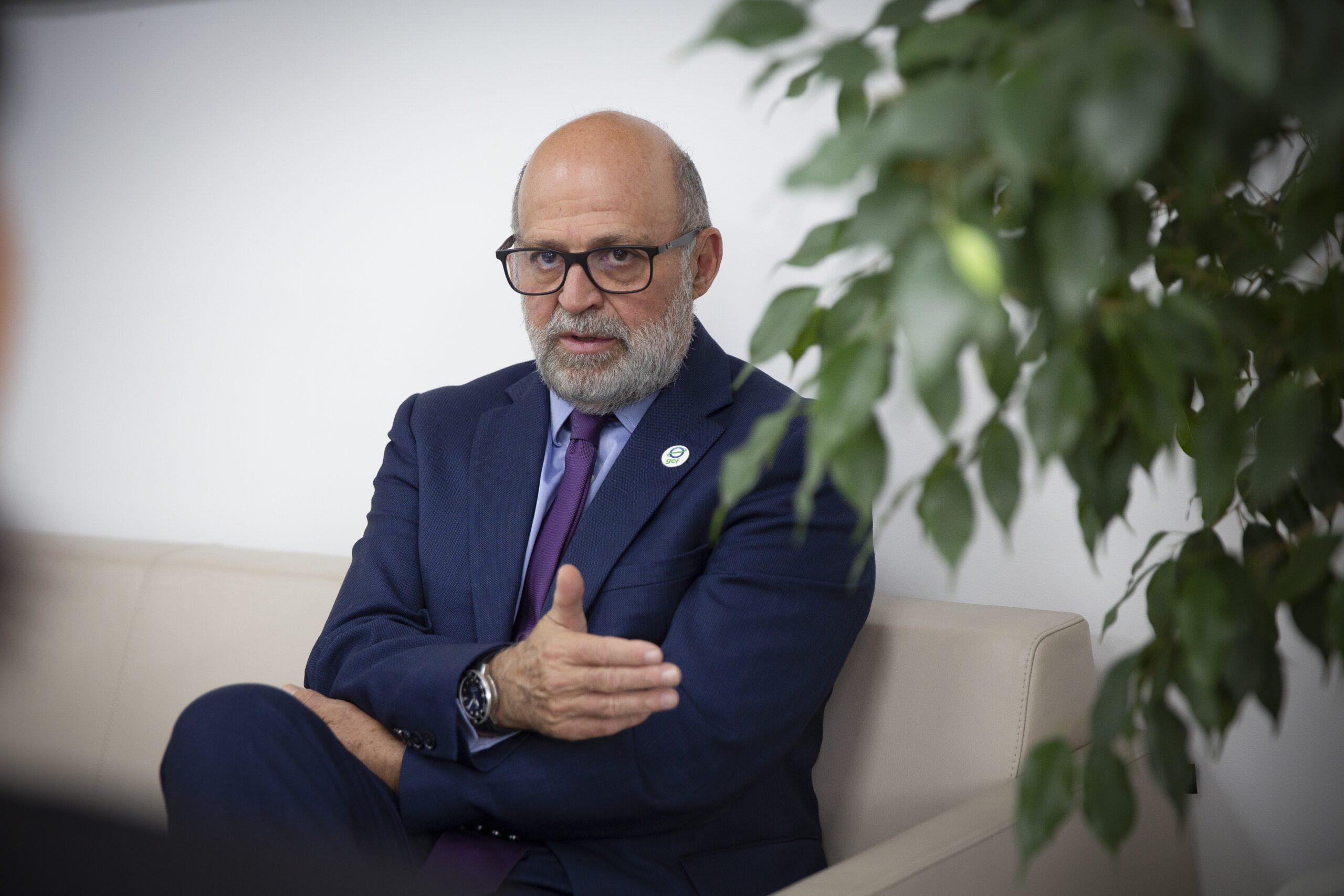ASTANA — In an exclusive interview during his official visit to Kazakhstan, Carlos Manuel Rodríguez, the CEO and Chairman of the Global Environment Facility (GEF), shared insights into the organization’s mission and its efforts to address environmental challenges in Central Asia. The interview sheds light on GEF’s role in supporting countries like Kazakhstan in confronting biodiversity loss, climate change, land degradation, and pollution while emphasizing the need for international cooperation and innovative financing mechanisms.

Rodriguez wrapped up his visit to Kazakhstan with a deep dive intoSharyn Canyon’s natural wonders. Photo credit: UNDP in Kazakhstan/Ainur Khaliollaeva
Supporting environmental priorities in Central Asia
Rodríguez highlighted the GEF’s commitment to assisting developing countries in fulfilling their environmental commitments, including those related to climate and biodiversity conventions. Over the past two decades, the GEF has been instrumental in financing and implementing national plans to conserve biodiversity, combat climate change, and promote sustainable land management. In Kazakhstan alone, the GEF has supported over 40 projects worth more than $137.3 million, contributing significantly to environmental conservation and renewable energy development.
Referencing Kazakhstan’s environmental challenges, including issues surrounding the Caspian and Aral Seas, Rodríguez underscored the need for comprehensive, cross-sectoral investments.

Carlos Manuel Rodriguez, Director General and Chairman of the Global Environment Facility (GEF). Photo credit: UNDP in Kazakhstan/Ainur Khaliollaeva
“For 30 years, we’ve done great work with the ministers of environment, and there are sustainable concrete results out of that. But that hasn’t been enough to reverse the degradation tendency that often comes out of other sectors’ policies and incentives. Looking into the future, the GEF looks to do more comprehensive work across sectors and investments at the country level. I think that we have done great, but that is not enough,” he said.
While acknowledging progress made in environmental conservation, he stressed the importance of addressing unsustainable practices across various sectors, such as agriculture and infrastructure, which often exacerbate environmental degradation.
“This is where the GEF looks into more integrated approaches across sectors. I believe that Central Asia has a lot of potential to maximize the resources of the GEF because we will never have enough resources to restore the Aral Sea. For example, we will never have enough resources to protect the Caspian Sea. But, we can have resources to align all institutions and ministries under the same roles and responsibilities. This is what I believe we need to do,” he said.
Payment for ecosystem services: a sustainable financing model
One of the key topics discussed was the concept of Payment for Ecosystem Services (PES), a strategy aimed at mobilizing resources for nature conservation and climate action. During his time as the Minister of Environment and Energy for Costa Rica, Rodríguez spearheaded groundbreaking efforts in advancing PES programs and devising tactics for forest regeneration, marine preservation, and carbon reduction. Throughout his tenure spanning three terms, Costa Rica witnessed a doubling in forest coverage, achieved a 100 percent clean and renewable energy profile in its electric sector, and solidified its National Park System, elevating the nation to a premier hub for ecotourism.

Rodriguez met with Special Representative of the Kazakh President for International Environmental Cooperation Ms. Suleimenova on Feb. 18 Photo credit: UNDP in Kazakhstan/Ainur Khaliollaeva
Rodríguez emphasized the importance of recognizing the value of environmental services, such as carbon sequestration and biodiversity conservation and compensating those who provide them.
“The concept is to pay those people, it can be a farmer, it can be a cooperative, it can be a company, it can be a country, let’s pay them for the services that they provide. Who should be paying? Not the government because it will be a subsidy. The ones who should pay are the ones who are benefiting,” he explained.
Drawing from Costa Rica’s experience, where PES initiatives have been successfully implemented, he highlighted the potential of this approach to incentivize sustainable land management practices and generate revenue for conservation efforts.
According to Rodríguez, in Costa Rica, a tax on carbon emissions has been implemented, wherein users of fossil fuels, whether for transportation or industrial purposes, incur an additional charge of 3.5%. Most of these funds are allocated to the National Forestry Financing Fund, distinct from government funding. This forest fund operates through a collaborative effort involving the government, the private sector, and civil society, showcasing a robust organizational model. The revenue generated is distributed among various beneficiaries, including farmers, small to large-scale enterprises, and indigenous communities, with criteria encompassing diverse sectors. Payments, averaging around $78 per hectare annually, aim not only to compensate for unrecognized market services but also to surpass the opportunity cost associated with traditional agricultural practices or livestock rearing.
“So by doing this, we channel resources from the one who receives the biomass from the one who will receive the environmental service to the one who provides. In these cases, the government can be very happy because the government is not putting in the money. The government is managing the forest fund with transparency monitoring; this is a good example of how countries can mobilize resources to protect nature,” he said.
The imperative of global cooperation in nature conservation
Rodríguez emphasized the urgent need for global cooperation in tackling environmental challenges, emphasizing the interconnectedness of environmental issues and the importance of multilateralism.
“We have seen floods in countries which are arid or desert countries. I mean, climate change is here, and it is going to be here for the rest of our lives. Who knows how many generations, the only way we can tackle these global problems is by international cooperation. The problem for me is not an environmental challenge. At the end of the day, what we have is a political challenge,” he said.
He underscored the role of civil society and scientific research in fostering international collaboration.
“My biggest concern, having a big experience in multilateral environmental negotiation, is that there are movements that don’t believe in multilateral organization and don’t believe in international cooperation. This is the only way we can deal with growing global problems. I believe that a way by which we can tackle that is by investing more in civil society, investing more in science, and using science as the main source of decision-making,” he said.
